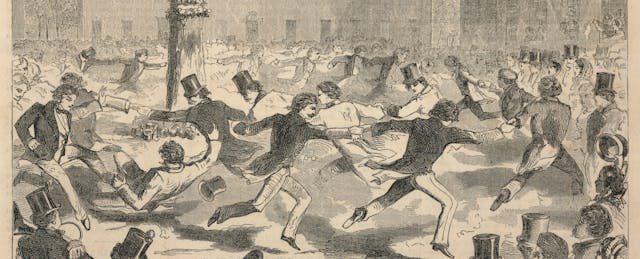College campuses are designed to be social places, and the mixing and mingling that occurs at all hours on university grounds is part of what makes the residential experience appealing to many students.
So whether colleges decide to hold fall classes online or in person with modifications, students will want to know: What about all the fun stuff?
Sororities and fraternities are already working to answer that question. And leaders of Greek organizations believe their brand of camaraderie may be exactly what universities need to keep students committed to their institutions and help sustain school spirit as the pandemic continues.
“There is a sense of community and connection that we offer,” says Dani Weatherford, CEO of the National Panhellenic Conference, which represents more than two dozen sororities. “I think the university will need that even more if they are offering virtual classes or a hybrid model.”
The national coalitions of fraternities and sororities are crafting contingency plans to help members of campus chapters think ahead about how to conduct all their usual business—and, of course, the fun. Leaders say students in Greek organizations will be expected to adhere to institutional and state health guidelines at colleges that reopen their campuses.
“The guidance is very clear. They have to follow whatever their state’s public health expectations are,” says Judson Horras, president and CEO of the North American Interfraternity Conference, which represents more than 60 fraternities. “Big parties, all those events, those can’t happen if the state doesn’t allow it. If the university allows gatherings of a certain size, the fraternities will gather at those sizes.”
That may mean moving member recruitment events online—an option that some Greek organizations have already tried, using virtual game nights, remote Netflix viewing parties and online interviews. It may also mean changing living conditions to facilitate more social distancing in fraternity and sorority houses, which are the second-largest provider of accommodations for college students behind universities themselves, according to Weatherford.
At colleges that don’t reopen their campuses, the virtual gatherings that have already been taking place will continue, leaders say. Greek organizations are encouraging members to meet via video call (changing bylaws as necessary to allow for electronic meetings) and organize entertaining remote social opportunities like video game tournaments.
National leaders say affiliated students have already taken the lead in devising new ways to gather online. For example, fraternity members at the University of Delaware organized a charity concert on Instagram Live that raised money for medical workers. And some sororities turned their spring formals into virtual experiences.
It turns out, Weatherford says, that “sisterhood can be a virtual experience.”
Keeping Students Engaged
That’s a lesson that may interest college administrators wondering how to convince students to enroll for what will undoubtedly be a very unusual autumn term.
Greek organizations already play an important role in recruiting new students to colleges, Horras says, explaining that some fraternity chapters regularly reach out to admitted high school seniors who are still deciding where to matriculate.
“It helps the school secure their freshman class,” Horras says. “Now more than ever, the schools appreciate that help.”
For students who are weighing whether to return to the institutions they left this spring, a Greek-life connection may nudge them toward doing so.
“We know our communities will be the ones that help rebuild campus life. There’s a sticky factor for our members and our organizations,” Weatherford says. “They will recruit each other to come back to campus.”
That rings true to Emily Perlow, an assistant dean of students who serves as co-chair of the National Association of Student Personnel Administrators Fraternity/Sorority Knowledge Community. She notes that studies have found that participation in a sorority or fraternity correlates with improved college graduation outcomes.
“I worry deeply about retaining students and keeping them invested on a campus where college doesn’t look like what they saw on TV,” Perlow says. “Gen Z is searching for connections and feels lonely. I think fraternities and sororities can be a wonderful place where those connections are formed.”
Managing Student Behavior
Still, the prospect of students returning to campuses and resuming Greek life activities—or any socializing, for that matter—raises health worries for some education leaders.
“In general, students who are college-aged tend to think they are invincible and behave in commensurate ways. I wonder if we are going to see the same good faith social distancing practices put in place by college-aged students,” Perlow says. “They are anxious to feel connection with folks. Trying to stay six feet away, never eating with anyone, not attending large social gatherings will be challenging for students.”
Managing health risks in fraternity and sorority housing may be especially challenging, since colleges sometimes have only limited influence over what happens in those facilities. But that concern is not limited to Greek life, Perlow adds: “It’s that off-campus apartment party that I, working at a dean of students office, worry about in the same capacity.”
As the summer progresses, college leaders will be thinking about ways to encourage individual students and student groups to follow public health guidelines. That may mean punishing people who violate pandemic codes of conduct. But administrators may also find opportunities to tap into the social power Greek organizations have to set cultural norms on campus.
For example, in addition to adding signs on campus about handwashing and mask-wearing, Perlow envisions colleges developing peer-to-peer campaigns in which students challenge each other to stay safe.
“This generation very much cares what their peers think of them,” she says. “I think fraternities and sororities on many campuses have a lot of social leaders that have social capital to influence student behavior. Tapping those student leaders to try to influence the campus culture will be really important.”


